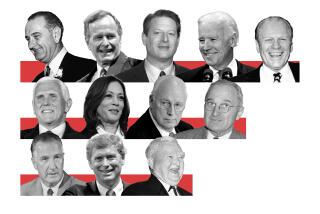NEWS ANALYSIS : Mubarak Has Deadly Foes, No Successor
- Share via
CAIRO — This week’s failed assassination attempt against Egyptian President Hosni Mubarak raises again the issue of who might succeed the 67-year-old leader, who presides over Egypt with a degree of power approaching monarchy.
Mubarak was vice president in 1981 when the murder of then-President Anwar Sadat elevated him. In the 14 years since, Mubarak has left the vice presidency vacant, saying he has not yet found the right man for the job. (And we are talking about a man; women hold few positions of power in Cairo.)
People viewed as potential successors have come and gone in the interim, and today there is no consensus choice in the wings.
“People are asking themselves, ‘What would have happened if the attempt had been successful?’ It would have been chaotic, indeed. He [Mubarak] has to answer that question,” said Hussein Amin, a university professor and former diplomat.
While the issue has long been the subject of dinner table conversation and quiet speculation among officials, it is rarely voiced within Mubarak’s earshot.
That changed this week, when the semiofficial newspaper Al Ahram quoted Saad Eddin Ibrahim, a distinguished sociologist, as saying that it is “absolutely necessary” to fill the vice presidency “so that Egyptians may feel psychologically secure.”
The issue has become more urgent, some believe, with the rise of militant Islam as the principal opposition to Mubarak. Amin, for example, argues that an uncertain succession might present the radicals an opportunity to achieve in politics what they have been unable to win in a three-year campaign of violence--imposition of a strict Islamist government.
On paper, the succession would be fairly direct.
If Mubarak left office without a vice president, the presidency would temporarily be filled by Fathi Serour, Speaker of the People’s Assembly, Egypt’s Parliament. The assembly then would elect, by at least a two-thirds vote, a president who would be ratified by referendum.
*
In reality, the process could be far more complex. While Egypt describes itself as a democracy, in truth it is a near one-party state. Mubarak’s National Democratic Party maintains a firm grip on the People’s Assembly, the mass media, the military and the internal security apparatus.
Because Serour is not considered a strong candidate, Egypt’s political Establishment would have to coalesce behind someone else.
Two names frequently mentioned as possible successors are the defense minister, Field Marshal Hussein Tantawi, and Foreign Minister Amir Moussa. But it might be hard to find someone in Cairo willing to post odds on either--or anyone else.
The argument that the Islamists could exploit the power vacuum hinges on the contention that a new president, largely untested and unfamiliar to the people, would need to take a dramatic step to gain credibility.
“A successor must have some sort of claim of legitimacy,” said Amin, a professor of Islamic studies at the American University in Cairo. “. . . . If someone said the Koran is our constitution and Islam is the solution, the majority of the people would say, ‘Why not? We’ve tried everything else this century, why not try the one thing we haven’t, which is an Islamic republic?’ ”
It is a nightmare scenario for Washington and for many Christian and secular Muslim Egyptians: the coming to power of a militant regime hostile to the West and the Middle East peace process and even less democratically inclined than Mubarak.
But there are plenty of people who contest that view. Their contention, as articulated by a veteran Western diplomat here, is that Egypt’s political and economic Establishment has too much to lose in a strict Islamic state and would fairly quickly unite behind one man.
They also say the Islamist scenario overestimates the nation’s appetite for dramatic--and traumatic--change. “Egypt’s capacity for muddling through is infinite,” said one American university professor who recently completed a study tour of the country.
More to Read
Sign up for Essential California
The most important California stories and recommendations in your inbox every morning.
You may occasionally receive promotional content from the Los Angeles Times.













